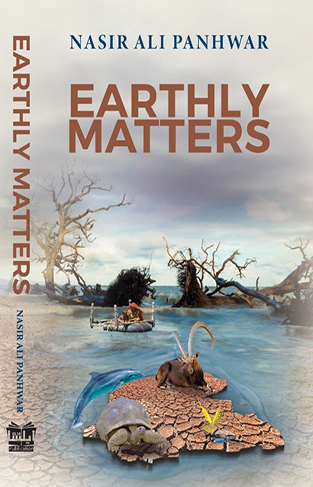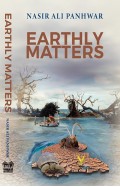Earth Matters
By: Nasir Ali Panhwar
-
Rs 800.00
- Rs 1,000.00
- 20%
You save Rs 200.00.
Due to constant currency fluctuation, prices are subject to change with or without notice.
In July 2023, the World Meteorological Organisation said
in a
statement that the first week of July had been the
hottest week the world oversince temperatures werere corded and records kept.
It also said that the Antarctica has been unusually cold at this time while the
Artic was warmer than usual. One can say definitively now for the benefit of
the climate skeptics-if they still exist -- that global warming is today a well
established and auniversally accepted reality. What will be the future trends
will now be determined by humankind's reaction to the information on climate
change and the environment so freely available now. If governments cooperate
and change their policies and the people adjust their lifestyles, the planet
can stillbe saved.True,governments
have been a hard nut to crack as is evident fromthe difficulties encounters in
negotiating the climate treaty and the cavalierlytreatment mete out to it after
it was adopted. But one cannot ignore thenegative role of the populations in
the matter. There has been minimalcooperation at the popular level in efforts to
preserve the environment andconserve natural resources. Wastage ha sbeen rampant
with little thought to its harmful implications. It is in the latter context
that we as members of civil society need to join hands to create public
understanding and awareness of the dangers we face and the role each person can
play to save the world from destruction.Hence it can appropriately be said that
Earthly Matters is a book that is most timely. Nasir Ali Panwhar has collected
his articles - 81 of them - published in Dawn, The Express Tribune and The
News. They have been made them easily accessible in the form of a book.
Readable and informative, the articles should keep the reader engaged since all
the topics covered relate to Pakistan which makes the writing most relevant and
pertinent. The gravity of the problems in many cases is not widely known while
suggesting solutions to the challengesa is only possible by a person who
understands the issues. Take the example of Karoonjhar in Tharparker. It is
hardly known to people generally and that has allowed vested interests to
exploit the mineral wealth and the rich flora and fuana to make money. This has
endangered the wild life in the region. The vultures are heading to extinction.
Similarly another article on the excessive use of persticides points to the
negative impact of this practiceon our crops should be an eye-opener for those
who do not know about it. Yet another piece pleads for clean and cheap energy
and makes a convincing case for solar and wind energy. The readers should be
thankful to the author for drawing their attention to such matters that are not
just earthly but also existential.
In July 2023, the World Meteorological Organisation said
in a
statement that the first week of July had been the
hottest week the world oversince temperatures werere corded and records kept.
It also said that the Antarctica has been unusually cold at this time while the
Artic was warmer than usual. One can say definitively now for the benefit of
the climate skeptics-if they still exist -- that global warming is today a well
established and auniversally accepted reality. What will be the future trends
will now be determined by humankind's reaction to the information on climate
change and the environment so freely available now. If governments cooperate
and change their policies and the people adjust their lifestyles, the planet
can stillbe saved.True,governments
have been a hard nut to crack as is evident fromthe difficulties encounters in
negotiating the climate treaty and the cavalierlytreatment mete out to it after
it was adopted. But one cannot ignore thenegative role of the populations in
the matter. There has been minimalcooperation at the popular level in efforts to
preserve the environment andconserve natural resources. Wastage ha sbeen rampant
with little thought to its harmful implications. It is in the latter context
that we as members of civil society need to join hands to create public
understanding and awareness of the dangers we face and the role each person can
play to save the world from destruction.Hence it can appropriately be said that
Earthly Matters is a book that is most timely. Nasir Ali Panwhar has collected
his articles - 81 of them - published in Dawn, The Express Tribune and The
News. They have been made them easily accessible in the form of a book.
Readable and informative, the articles should keep the reader engaged since all
the topics covered relate to Pakistan which makes the writing most relevant and
pertinent. The gravity of the problems in many cases is not widely known while
suggesting solutions to the challengesa is only possible by a person who
understands the issues. Take the example of Karoonjhar in Tharparker. It is
hardly known to people generally and that has allowed vested interests to
exploit the mineral wealth and the rich flora and fuana to make money. This has
endangered the wild life in the region. The vultures are heading to extinction.
Similarly another article on the excessive use of persticides points to the
negative impact of this practiceon our crops should be an eye-opener for those
who do not know about it. Yet another piece pleads for clean and cheap energy
and makes a convincing case for solar and wind energy. The readers should be
thankful to the author for drawing their attention to such matters that are not
just earthly but also existential.
Zubin Mehta: A Musical Journey (An Authorized Biography)
By: VOID - Bakhtiar K. Dadabhoy
Rs 472.50 Rs 1,050.00 Ex Tax :Rs 472.50
Myths Illusions and Peace: Finding a New Direction for America in the Middle East
By: Dennis Ross
Rs 876.00 Rs 1,095.00 Ex Tax :Rs 876.00
Manning Up: How the Rise of Women Has Turned Men into Boys
By: Kay Hymowitz
Rs 646.75 Rs 995.00 Ex Tax :Rs 646.75
No similar books from this author available at the moment.
No recently viewed books available at the moment.
Zubin Mehta: A Musical Journey (An Authorized Biography)
By: VOID - Bakhtiar K. Dadabhoy
Rs 472.50 Rs 1,050.00 Ex Tax :Rs 472.50













-120x187.jpg?q6)










-120x187.jpg?q6)


